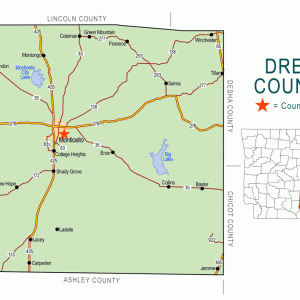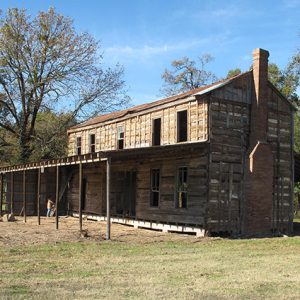calsfoundation@cals.org
Winchester (Drew County)
| Latitude and Longitude: | 33°46’28″N 091°28’28″W |
| Elevation: | 154 feet |
| Area: | 0.50 square miles (2020 Census) |
| Population: | 137 (2020 Census) |
| Incorporation Date: | May 21, 1912 |
Historical Population as per the U.S. Census:
|
1810 |
1820 |
1830 |
1840 |
1850 |
1860 |
1870 |
1880 |
1890 |
1900 |
|
– |
– |
– |
– |
– |
– |
– |
– |
– |
– |
|
1910 |
1920 |
1930 |
1940 |
1950 |
1960 |
1970 |
1980 |
1990 |
2000 |
|
– |
217 |
221 |
171 |
198 |
185 |
234 |
279 |
239 |
191 |
|
2010 |
2020 |
|
|
|
|
|
|
|
|
|
167 |
137 |
|
|
|
|
|
|
|
|
Winchester is a town in northeastern Drew County, near U.S. Highway 65. Winchester is most notable as the home of Robert L. Hill, the African-American founder of the Progressive Farmers and Household Union of America.
Drew County is crossed by the Bayou Bartholomew, which was long a principal transportation route of southeastern Arkansas. John Martin Taylor, a wealthy physician and farmer, purchased land near the bayou in 1848 and built a plantation house. In 1860, Winston J. Davie purchased farmland to the east of Taylor’s plantation, near the present location of Winchester.
In the late 1870s, the St. Louis, Iron Mountain and Southern Railroad built a line that crossed Drew County near Davie’s farm. The railroad depot and post office constructed at that point were named Winchester, presumably because Taylor had been born in Winchester, Kentucky. The post office opened in 1879, closed in 1880, and reopened in 1881. Winchester became a shipping point for logs, ties, and other wood products. Later, cotton was also shipped by rail from Winchester. The first store opened in 1893.
A one-room schoolhouse for white children was built around 1900. A separate school for African-American children was built soon after. A Methodist church was organized in 1902, followed a few years later by a Baptist church. The town was incorporated in 1912. By that time, it had a bank, two cotton gins, a broom factory, a chair factory, and several stores. A newspaper, the Winchester Independent, was published for a few years. The town also had a sawmill, a skating rink, a café, and a Chinese bakery. Moreover, the town had a baseball diamond with an active team. The Cypress Creek Drainage District created new farmland in the area during the early years of the twentieth century.
In 1918, Robert L. Hill founded the Progressive Farmers and Household Union of America (PFHUA) in Winchester. The law firm of Williamson and Williamson in Monticello (Drew County) drew up the articles of incorporation for Hill. The union was a fraternal and social organization for African-American men and women; it was modeled upon the Masonic lodge and other secret societies. An exchange of gunshots during a meeting of the union on September 30, 1919, in Hoop Spur (Phillips County) led to what became known as the Elaine Massacre. Soon after the massacre, the PFHUA disbanded.
In 1926, the highway passing through Winchester was designated U.S. Highway 65. Two filling stations were built in Winchester along the highway, and more than a dozen stores met the needs of residents and travelers. The Depression damaged the agriculture and timber industry of the region, and Winchester began to lose population in the 1930s. In 1940, the highway was improved, but it bypassed Winchester by a mile to the east. World War II and the mechanization of farming contributed to the continuing decline of Winchester. A movie theater opened in Winchester after the war. The two schools were consolidated into the Dumas (Desha County) School District in 1956. The town’s water system was updated in 1963.
In a county history published in 1980, Winchester was described as a “stable agricultural center.” Around 2000, Mayor Merle Jackson helped to establish a community center, a food pantry, and adult education programs. She received grants and government assistance to help fund improvements in the town. By 2015, Winchester had a heating and air conditioning business, a vinyl construction business, and a crop production service, as well as a Missionary Baptist church. However, the community has suffered due to lack of a municipal sewage system. Winchester applied for a grant in 2016, but the money was unavailable, leading community leaders to reapply the following year. In 2017, the community was approved for funds to link drinking and wastewater systems to nearby Dumas. The population in 2010 was 167, including 115 black residents and forty-five white. The Taylor Log House and Site west of Winchester were added to the National Register of Historic Places on October 16, 1995.
For additional information:
DeArmond, Rebecca. Old Times Not Forgotten: A History of Drew County. Little Rock: Rose Publishing, 1980.
DeArmond-Huskey, Rebecca. Bartholomew’s Song: A Bayou History. Bowie, MD: Heritage Books, 2001.
Lampkin, Sheilla. “Winchester: A Town of the Drew County Delta.” Drew County Historical Journal 19 (2004): 45–48.
Steven Teske
Butler Center for Arkansas Studies
 Drew County Map
Drew County Map  Taylor Log House and Site
Taylor Log House and Site 




Comments
No comments on this entry yet.